| Srl | Item |
| 1 |
ID:
154835
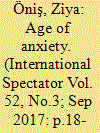

|
|
|
|
|
| Summary/Abstract |
The crisis of liberal democracy is closely associated with major global shifts, which have been accelerated by the global financial crisis of 2008, with its dislocating effects in the established democracies of the global centre. Relative stagnation and rising problems of inequality and unemployment, coupled with additional shocks in the form of mass migration and terrorist attacks have generated fertile grounds for the rise of right-wing radical populist sentiments, which have been turned into electoral advantage by charismatic leaders. The crisis of liberal democracy is also a global phenomenon in the sense that liberal democracy has been severely challenged by the rise of strategic models of capitalism, notably its authoritarian version represented by the growing power and influence of the China-Russia coalition. Indeed, the success of the latter has served as a kind of reference for many authoritarian or hybrid regimes in a changing global context, at a time when the key Western powers appear to be losing their previous economic and moral appeal.
|
|
|
|
|
|
|
|
|
|
|
|
|
|
|
|
| 2 |
ID:
176543
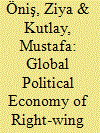

|
|
|
|
|
| Summary/Abstract |
The rise of right-wing populism should be studied as a truly global phenomenon. Domestic and regional contexts are obviously crucial, yet a narrow focus on the domestic realm fails to capture some of the key constituents and paradoxical features of the rise and resilience of right-wing populist projects around the world. Therefore, right-wing populism and the way its contradictions are ‘managed’ ought to be understood within the context of mutual interactions between: 1) an economy-identity nexus and 2) a domestic-foreign policy nexus. A critical review of six controversial aspects of right-wing populism in the global North and global South is used to substantiate this main argument.
|
|
|
|
|
|
|
|
|
|
|
|
|
|
|
|
| 3 |
ID:
168839
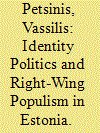

|
|
|
|
|
| Summary/Abstract |
This case study focuses on Estonia and introduces the populist and radical right-wing party of EKRE (Eesti Konservatiivne Rahvaerakond/Estonian Conservative People’s Party). It demonstrates that EKRE’s employment of identity politics over the refugee question and immigration is embedded inside the pre-existing frame of Estonian restoration and “decolonization” nationalism. The party’s campaign over the refugee question and immigration interlinks the collective memories of “colonization” under the Soviets with the collective anxieties of becoming “colonized” again by others in the future. This sociopsychological strategy has facilitated EKRE in augmenting its public appeal and consolidating its status as a potent actor in Estonian politics.
|
|
|
|
|
|
|
|
|
|
|
|
|
|
|
|
| 4 |
ID:
185752
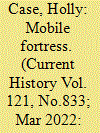

|
|
|
|
|
| Summary/Abstract |
Hungarian Prime Minister Viktor Orbán rails against migration from countries outside of Europe, yet he has been eager to grant citizenship to Hungarian-speakers from countries in the near abroad. Like other populist conservative leaders in the region, he promotes a fortress mentality, based on fear of an “uncertain world,” to remake his country—renewing strategies pursued by Hungarian governments in the early twentieth century.
|
|
|
|
|
|
|
|
|
|
|
|
|
|
|
|
| 5 |
ID:
167234
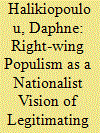

|
|
|
|
|
| Summary/Abstract |
Right-wing populist parties have significantly increased their electoral support in recent years. This has also triggered an increase in scholarly interest in the topic. Most existing explanations focus on demand, putting forward different versions of a cultural grievance story underpinned by a common focus on immigration. Instead, in order to understand the rise of right-wing populism, the focus must also be on the supply side and more specifically on the ways right-wing populists themselves attempt to make their message more appealing to broader sectors of the population. At the core of this argument is nationalism: the examples of the German AfD and the French FN show that the adoption of a predominantly civic nationalist rhetoric allows these parties to appear legitimate to a broad range of social groups with different backgrounds and preferences.
|
|
|
|
|
|
|
|
|
|
|
|
|
|
|
|
| 6 |
ID:
167627
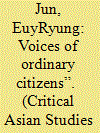

|
|
|
|
|
| Summary/Abstract |
This article looks at the rapid emergence of ban damunhwa (“anti-multiculture”) or the sentiment of anti-immigration in South Korea. Ban damunhwa discourse centers on a variety of issues such as the state's multicultural policy, crimes by foreigners, and problems of the so-called illegal sojourners, and has been most active and visible on the Internet, especially since the mid-2000s. This article focuses on the way ban damunhwa defines the state's multicultural policy as what gives special preferences to migrants, which, in turn, is said to destroy the livelihoods of South Korean citizens. Represented as the “voices of ordinary citizens,” ban damunhwa narratives appeal to a neoliberal idea of fairness and equity, under which migrants emerge as demonic free-riders. Ban damunhwa discourse not only serves as a symptom of a neoliberal ethic but also mirrors the dilemma of the people who struggle within a system of precarity and yet reproduce its main ideologies.
|
|
|
|
|
|
|
|
|
|
|
|
|
|
|
|